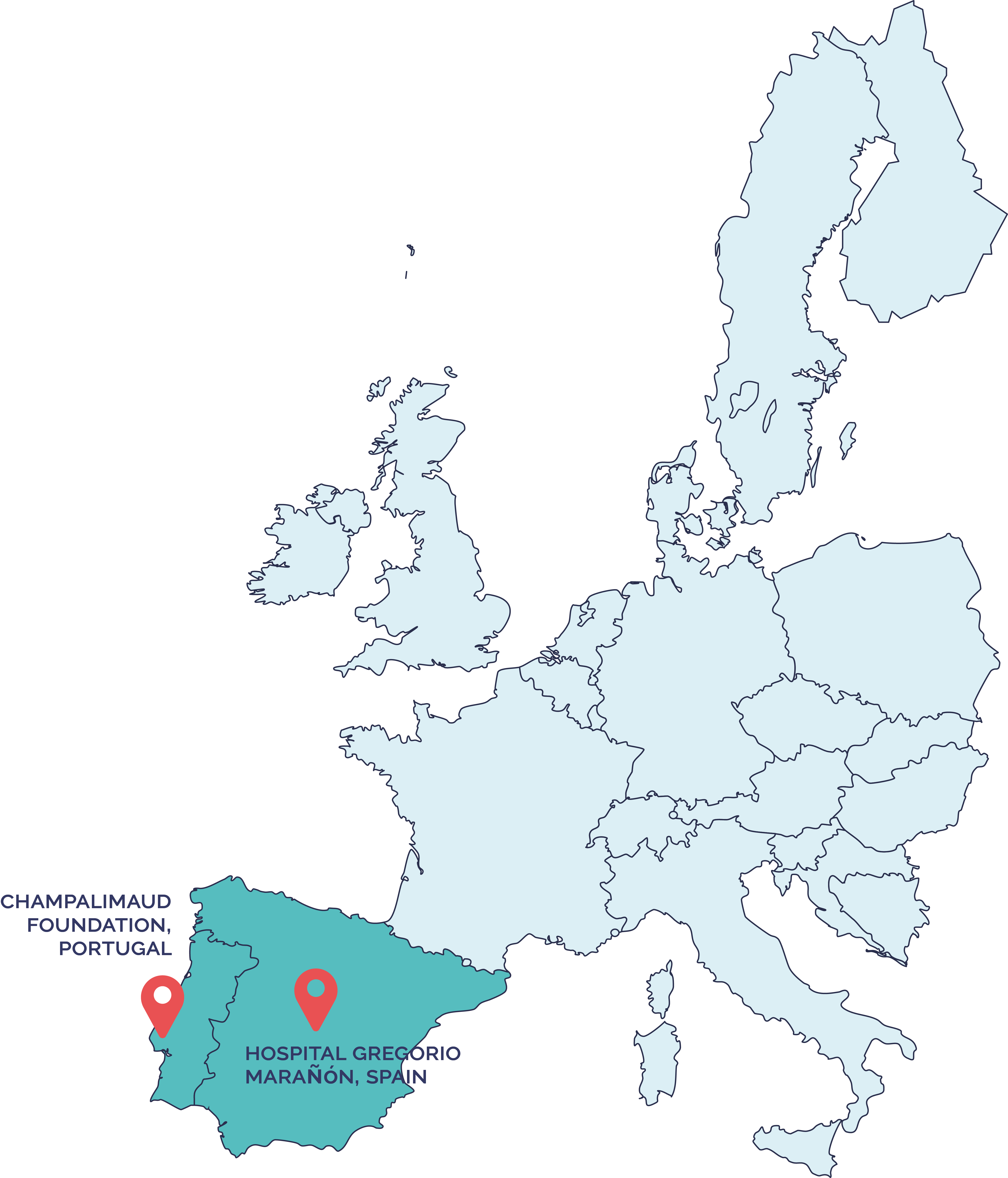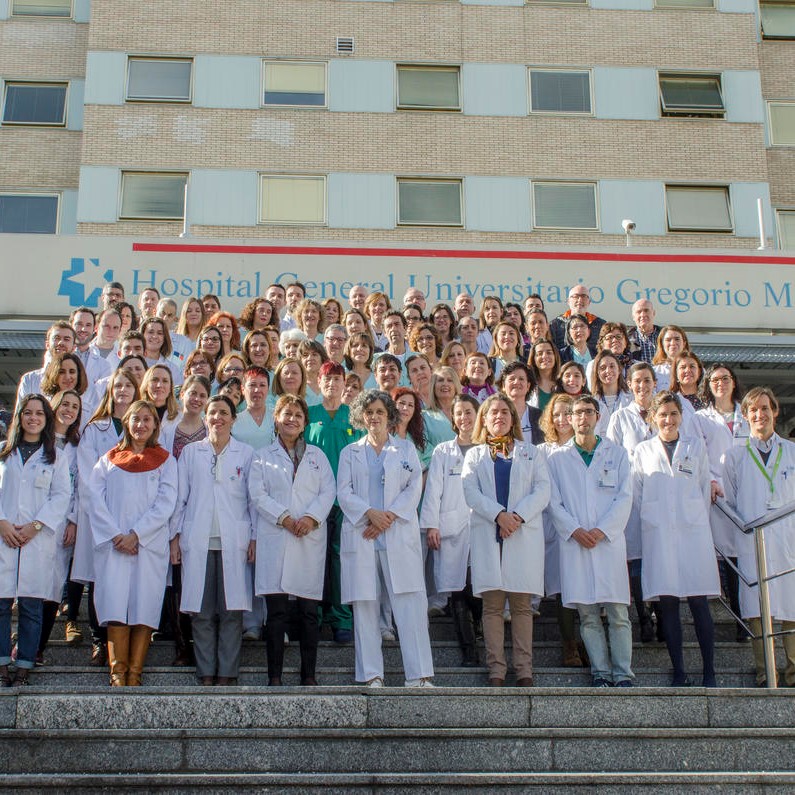
FAITH will have trial sites in two hospitals:
Champalimaud in Lisbon, Portugal
HGUGM in Madrid, Spain
The hospitals will carry out trial pilots involving real end users (both clinicians and patients) to collect the data necessary to train the AI algorithms behind the FAITH solution.
After an initial requirements gathering, the concept will be prototyped for a real-life situation trial to use at the hospital pilot sites. The trials, specifically related to each use case, will allow FAITH to be validated by doctors and patients according to their specific needs.
Results and findings from pilots’ execution will be used as feedback and input for a further round of requirements gathering and concept refinement.
All pilots will be subject to the highest ethical standards to assure the privacy and protection of data.
IMPLEMENTATION PHASES
PILOTS TRIAL SITES
Champalimaud Foundation | Lisbon, Portugal
Since 2010, the Champalimaud Foundation has been a state-of-the-art centre for research, diagnosis and treatment of cancer in Portugal. It houses the Champalimaud Clinical Centre (CCC), whose multidisciplinary teams focus their activity on the patient, offering care of excellence based on the most advanced technological means. Since its creation, the CCC has been involved in over 60 clinical studies, with a focus on clinical research and practice in cancer, systems pathology and neuropsychiatry.
Users
As a clinical partner, the Champalimaud Clinical Centre will involve 100 ambulatory, community dwelling, lung-cancer patients (of any type) with indication for oncological treatment over two years. All patients will receive psychological and cognitive assessments through psychosocial questionnaires, neuropsychological testing, and other constructs. The CCC will monitor them for 12 months after their first appointment, offering them intelligent post-cancer support.

Hospital G.U. Gregorio Marañón | Madrid, Spain

The Hospital General Universitario Gregorio Marañón (HGUGM) is part of the Servicio Madrileño de Salud, which manages and provides health services in the Public National Health Care system in the Region of Madrid. HGUGM comprises more than 20 buildings and employs over 7,500 professionals. The HGUGM provides direct healthcare to 450,000 citizens, and is the referral center for high-tech care at a national level. Its Medical Oncology Service, composed by a multidisciplinary team of professionals, delivers comprehensive and individualized care to patients with different oncological pathologies, providing access to the most effective oncological treatments available on the market, as well as novel drugs in the process of development through participation in clinical trials.
Users
The pilot study will comprise 100 patients that are survival of breast cancer. They will be monitored to evaluate their quality of life and highlight possible aftercare needs, in order to provide better, personalized interventions.
The information obtained will allow doctors and healthcare professionals to detect different disorders that would help to design protocols and standards of care for an early intervention, improving patient’s quality of life.

FAITH will have trial sites in two hospitals:
Champalimaud in Lisbon, Portugal
HGUGM in Madrid, Spain
The hospitals will carry out trial pilots involving real end users (both clinicians and patients) to collect the data necessary to train the AI algorithms behind the FAITH solution.
After an initial requirements gathering, the concept will be prototyped for a real-life situation trial to use at the hospital pilot sites. The trials, specifically related to each use case, will allow FAITH to be validated by doctors and patients according to their specific needs.
Results and findings from pilots’ execution will be used as feedback and input for a further round of requirements gathering and concept refinement.
All pilots will be subject to the highest ethical standards to assure the privacy and protection of data.
IMPLEMENTATION PHASES
PILOTS TRIAL SITES
Champalimaud Foundation | Lisbon, Portugal

Since 2010, the Champalimaud Foundation has been a state-of-the-art centre for research, diagnosis and treatment of cancer in Portugal. It houses the Champalimaud Clinical Centre (CCC), whose multidisciplinary teams focus their activity on the patient, offering care of excellence based on the most advanced technological means. Since its creation, the CCC has been involved in over 60 clinical studies, with a focus on clinical research and practice in cancer, systems pathology and neuropsychiatry.
Users
As a clinical partner, the Champalimaud Clinical Centre will involve 100 ambulatory, community dwelling, lung-cancer patients (of any type) with indication for oncological treatment over two years. All patients will receive psychological and cognitive assessments through psychosocial questionnaires, neuropsychological testing, and other constructs. The CCC will monitor them for 12 months after their first appointment, offering them intelligent post-cancer support.
Hospital G.U. Gregorio Marañón | Madrid, Spain

The Hospital General Universitario Gregorio Marañón (HGUGM) is part of the Servicio Madrileño de Salud, which manages and provides health services in the Public National Health Care system in the Region of Madrid. HGUGM comprises more than 20 buildings and employs over 7,500 professionals. The HGUGM provides direct healthcare to 450,000 citizens, and is the referral center for high-tech care at a national level. Its Medical Oncology Service, composed by a multidisciplinary team of professionals, delivers comprehensive and individualized care to patients with different oncological pathologies, providing access to the most effective oncological treatments available on the market, as well as novel drugs in the process of development through participation in clinical trials.
Users
The pilot study will comprise 100 patients that are survival of breast cancer. They will be monitored to evaluate their quality of life and highlight possible aftercare needs, in order to provide better, personalized interventions.
The information obtained will allow doctors and healthcare professionals to detect different disorders that would help to design protocols and standards of care for an early intervention, improving patient’s quality of life.
